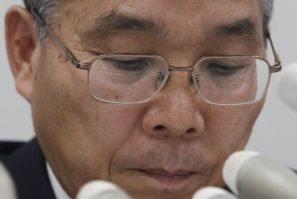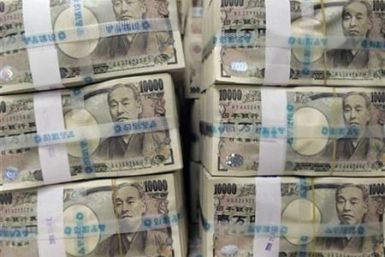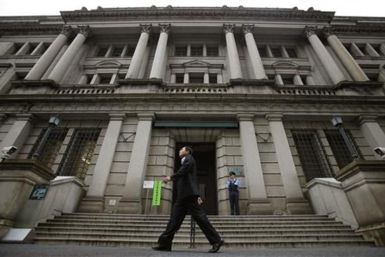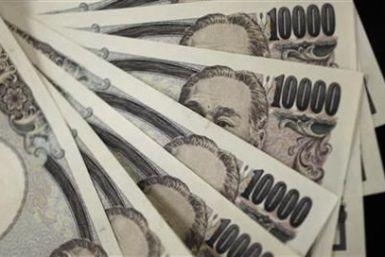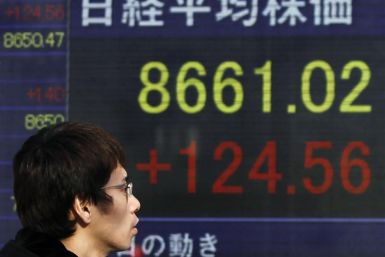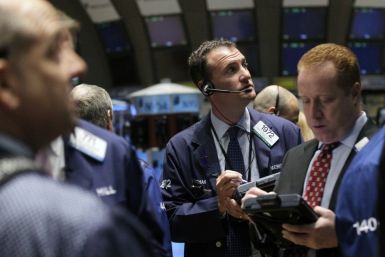Standard & Poor's Ratings Services said that it has affirmed Japan's sovereign debt rating at AA- along with maintaining its negative outlook as the country faces dismal fiscal position.
The market capitalization of U.S. equity markets has increased by $3 trillion since last October.
The Bank of Japan said Tuesday it increased its asset buying program by $130 billion and set an inflation target of one percent to stimulate economic growth and combat deflation.
The yen fell on Tuesday as the Bank ofJapan eased monetary policy by expanding its asset-buying scheme, but the impact on the currency may prove short-lived while nagging worries over the euro zone crisis keep it supported as a safe haven.
The Bank of Japan boosted its asset buying program by $130 billion on Tuesday and in the face of political pressure set an inflation goal of one percent, signaling a more aggressive monetary policy to pull an ailing economy out of deflation.
The Bank of Japan loosened monetary policy on Tuesday by topping up asset purchases in the face of mounting political pressure for bolder action to beat deflation and ease the pain on the economy from a strong yen.
Japan's Nikkei share average slipped on Tuesday but still hovered near the 9,000 level, with non-life insurers underperforming after MS&AD Insurance Group Holdings (8725.T) cut guidance on heavy losses on the flooding in Thailand.
Japan's economy shrank a bigger-than-expected 0.6 percent in October-December, hurt by slowing global growth, Thai floods and a strong yen, casting doubt about expectations that growth will resume this quarter as Europe's debt crisis clouds the outlook.
Japan's core consumer prices fell for the third consecutive month in the year to December, and mild deflation is expected to persist this year as energy prices stabilize and worries about Europe's debt crisis suppress wage growth and economic activity.
Japan logged a trade deficit of 2.49 trillion yen ($32 billion) for 2011, Ministry of Finance data showed on Wednesday, the first annual deficit since 1980.
The Bank of Japan forecast the economy will contract in the current fiscal year but kept policy steady on Tuesday, expecting exports to emerging markets and reconstruction after last year's earthquake will help fuel a steady recovery later in 2012.
Japan's Nikkei average edged higher on Tuesday and recovered its footing after better-than-expected Chinese economic data and solid demand at a French treasury bill auction reassured investors in the wake of European debt downgrades.
Japan's central bank offered a bleaker view of the economy and the government warned of worsening business sentiment as exports slumped, adding to evidence of the pain Europe's debt crisis is inflicting on global growth and Japan's recovery prospects.
The Bank of Japan kept monetary settings unchanged on Wednesday but offered a bleaker view on the economy than last month on mounting evidence of the pain Europe's debt crisis is inflicting on global growth and Japan's recovery prospects.
The Bank of Japan kept monetary settings unchanged on Wednesday but cut its assessment of the economy on mounting evidence of the pain Europe's debt crisis is inflicting on global growth and Japan's recovery prospects.
Asian stocks and the euro rose on Wednesday after upbeat U.S. and German data and strong demand for Spanish debt tempered risk-aversion, with investors' focus turning to a European Central Bank tender as a gauge for euro zone funding strains.
You can't blame investors for feeling a bit hesitant regarding deploying new money in the U.S. stock market these days. Lingering concern about Italy's finances, along with below-trend U.S. GDP growth has created an uncertain U.S./Europe economic outlook. Where's the Dow likely to head in the next six months?
Central bank action on Wednesday to ease severe funding strains for the world's private sector banks may help cushion a brewing global credit crunch but it only buys some wiggle room for governments trying to resolve the euro debt crisis and keep banks lending.
There is no quick fix to Europe's debt woes that threaten to escalate into a more widespread credit crunch, Bank of Japan Deputy Governor Kiyohiko Nishimura warned on Wednesday, voicing policymakers' growing concern about the deepening damage from the crisis.
Bank of Japan Governor Masaaki Shirakawa on Monday warned the country's economy will remain in a severe state for now as Europe's sovereign debt crisis and yen rises cloud the outlook, signaling the central bank's readiness to boost monetary stimulus further if risks to the recovery heighten.
President Barack Obama on Wednesday said he was deeply concerned about the euro zone crisis and market turmoil would continue until Europe has a concrete plan to deal with its sovereign debt woes.
Japan's economy rebounded from an earthquake-triggered recession in the third quarter by expanding 1.5 percent, a pace that is likely to slow down though as a strong yen and weak global growth darken the outlook.




